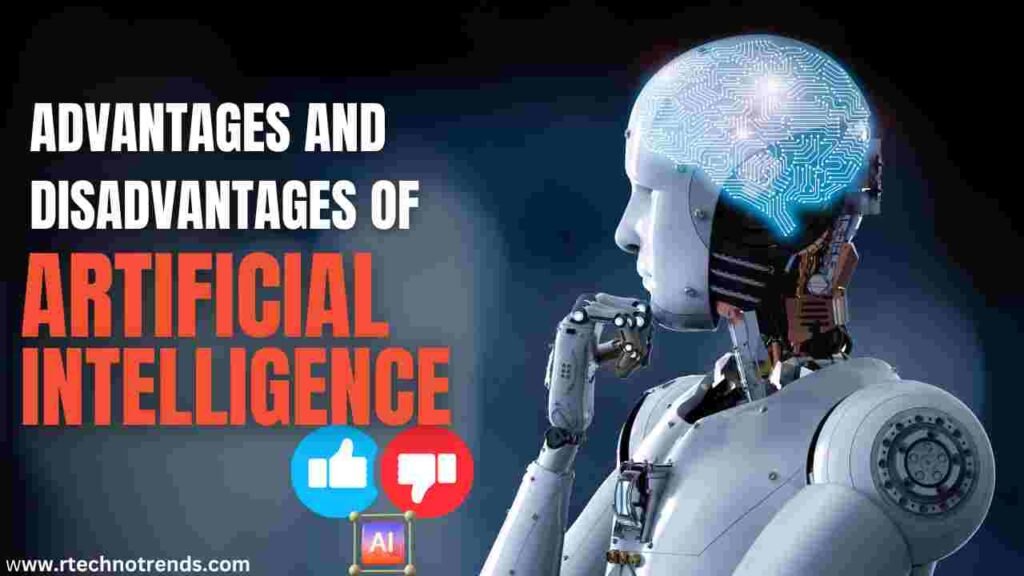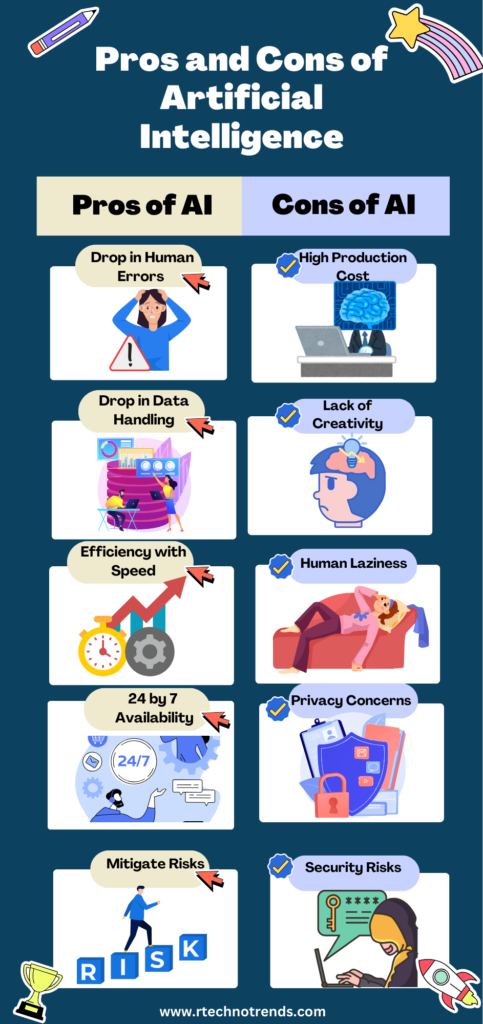Advantages and Disadvantages of Artificial Intelligence
Updated: December 27, 2024
160

Artificial Intelligence (AI) has been hailed as the catalyst in propelling the growth of businesses in various industries across healthcare, finance, agriculture, and much more. But even though AI has myriad of benefits, it is also prudent to carefully consider the disadvantages of adopting AI for businesses when compared to traditional programming methods. Here are some of the pros and cons of AI development as they compare to traditional computing methods.
AI is the ability of a computer program to replicate human intelligence and perform tasks such as learning, reasoning, problem-solving, and language understanding without the need for explicit programming. AI has boomed in recently and it’s widely being used in both business and everyday life. AI-powered virtual assistants or programs are widely used in our daily lives.
Businesses use AI to streamline their production processes, to minimize human errors, automate tasks done by humans, provide real-time data insights, and fraud detection, and improve the customer experience, among many other applications.

What Are The Advantages of Artificial Intelligence?
1. Drop in Human Errors & Data Handling
- We know humans make errors from time to time. However, if programmed correctly, computers do not make these mistakes.
- The AI systems learn continually from new data and experiences (from the previously gathered data). Hence errors are reduced and the chance of reaching accuracy allowing them to improve their performance over time with a greater degree of precision.
- The AI systems can make predictions by applying their algorithms that are better programmed for processing unstructured data such as videos, images, and human language text. Hence achieving better results and making fewer errors saving time and resources.
- AI algorithms can help businesses identify vast amounts of data quickly and with accuracy. Additionally, there is no chance of any compromise on quality over quantity.
2. Efficiency with Speed & 24/7 Availability
- The use of AI-assisted systems can process and analyse big datasets faster than human beings with less time and energy, hence enhancing productivity.
- AI systems are scalable and reliable as they remove bottlenecks and failures within no time.
- AI technologies can be sustainable enough as they can endure any environmental or social impact on their operation.
- Humans can work 6 to 8 hours a day including breaks. Without proper rest, humans get mentally and physically weak. Unlike humans, AI machines can run 24/7 without any breaks as they don’t get bored. AI systems are programmed in a manner that they can think and execute much faster than humans and perform various tedious tasks simultaneously while giving accurate results.
3. Helping in Repetitive Jobs & Mitigate Risks
- In our daily lives we perform many repetitive tasks like data entry, replying to emails and document verification for errors and much more. AI powered systems excel at automation of boring or repetitive tasks hence saving humans from boredom of repetitive tasks and frees up them for highly skilled and creative tasks. It ultimately creates more value for consumer.
- One of the biggest benefits of using AI systems is that they can do risky things for humans. For example, AI-enabled robots can undertake many risky tasks such as going to Mars, exploring deepest parts of marine life exploration, coal mining or assisting in any natural or man- made disasters and so on.
What Are The Disadvantages of Artificial Intelligence?
- High Production Cost and Lack of Creativity
- The development, implementation, and maintenance of AI systems is very expensive. Hence the initial set-up for AI needs a hefty amount and it also needs timely software and hardware to keep up with the latest requirements.
- Training teams to learn how to use the AI systems is an additional expenditure.
- AI won’t overtake humans means it can’t use emotions or creativity in its decisions.
- AI systems can learn over time from past experiences and pre-load data fed to them, but they cannot produce innovative solutions. Lack of innovation and human intuition are the reasons behind it.
2. Unemployment & Human Laziness
- With the launch of AI Robots and AI voice-activated assistants there is less human interference that results in job displacement thus it ultimately creates a negative impact on employment.
- In future, it is believed that conventional jobs are most likely be replaced by AI robots leading to unemployment.
- The availability of digital assistants increases machine dependency that can create human laziness.
- Too much relying on AI structures can lead to dependency problems. Conscious use of AI means not getting addicted to these inventions would always be better for our future generations.
3. Security Risks & Privacy Concerns
If the AI structures are not properly secured, they may be put your system at risk of
- cyber-attacks.
- malicious sports,
- misuse of AI competencies.
- concerns about data privacy, how it is dealt with stored, and misused.
Conclusion
Every human invention has both merits and demerits, as humans we should focus on the positive sides of the invention to create a better world. We know that artificial intelligence has many great advantages but we as humans should ensure that there is no misuse of the robots. Many people say that if Artificial intelligence goes into the wrong hands, it can certainly have adverse effects on human civilization.
Please Write Your Comments